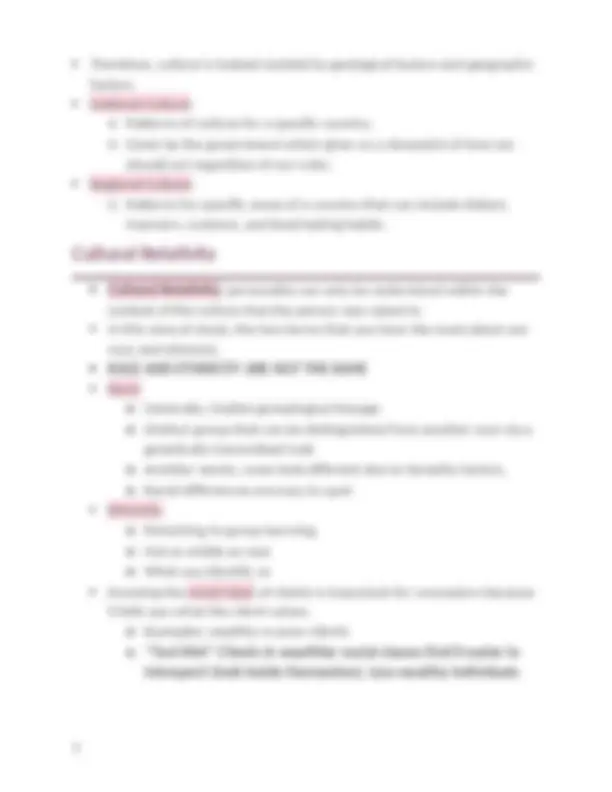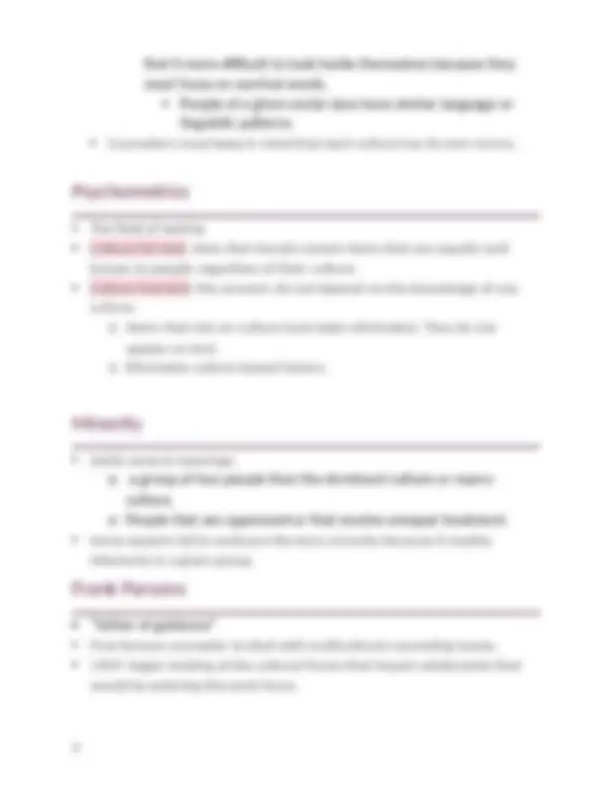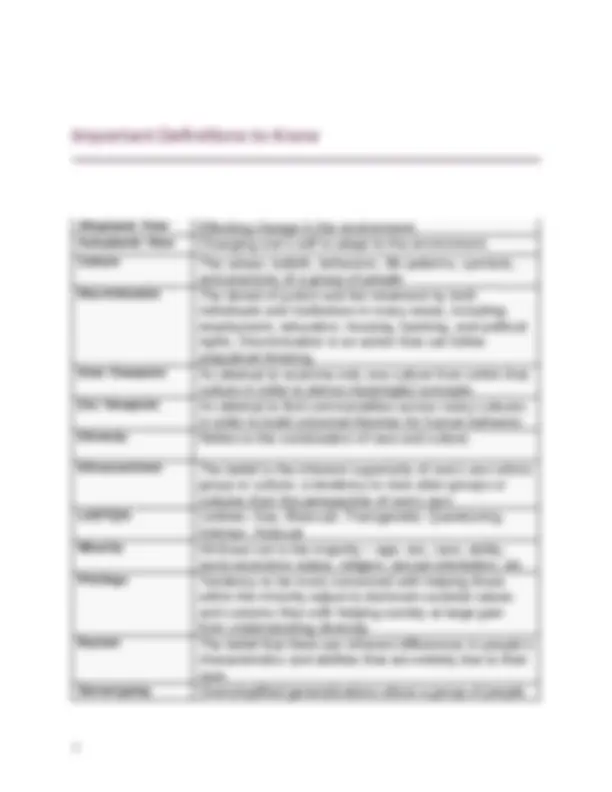





Study with the several resources on Docsity

Earn points by helping other students or get them with a premium plan


Prepare for your exams
Study with the several resources on Docsity

Earn points to download
Earn points by helping other students or get them with a premium plan
Community
Ask the community for help and clear up your study doubts
Discover the best universities in your country according to Docsity users
Free resources
Download our free guides on studying techniques, anxiety management strategies, and thesis advice from Docsity tutors
Study cheat sheet on multicultural counseling terms. NCE related
Typology: Cheat Sheet
1 / 6

This page cannot be seen from the preview
Don't miss anything!




Some experts believe this grew out of the civil rights movement and minority movement for equality in the 60s and 70s Also called cross cultural counseling: Where the counselor or therapist is seeing a client who has a different socio-cultural background Multiculturalism is the study of race, culture, and ethnicity. o The term “multicultural” implies that we champion the idea of celebrating diversity. Can include age, sexual orientation, religion, social class, country of origin, and even health status. Multicultural counselors must assess the client’s behaviors based on the client’s own culture. o Not merely based on the counselor’s culture. o The meaning or desirability of a given behaviors, trait, or act is based on the culture. Therapeutic surrender: Client must build a allegiance and rapport with someone (therapist) with someone who is from a different culture… and must be able to trust the helper o Resistance and failure to disclose are common issues in multicultural counseling.
Study of shared patterns of learned practices, communication patterns, morals, and esthetic standards in a given group or community. All cultures are dynamic. o All cultures change or evolve at different times. Culture refers to: o Customs shared by a group which distinguish it from other groups.
o Values shared by a group that are learned from others in the group. o Attitudes, beliefs, art, and language which characterize members of a group often passed from generation to generation. Macroculture/Majority Culture: the dominant culture or the culture that is accepted by majority of citizens in a given society. Acculturation: acquiring the patterns and characteristics of the particular culture. o The process of group-level change that can occur when two or more cultures meet. “Cultural Pluralism” to suggest that a minority cultural group will keep their own unique cultural values yet they still participate in the wider or dominant culture. Test Hint Culture refers to the total set of values, beliefs, attitudes, and even customs of a certain group of people and thus distinguishes them from other groups of people. Culture can be considered a way of life or the way a group of people can cope with the environment. Universal Culture o it has been said that we ALL share a universal culture after all. o Universal culture is the broadest category. It is also known as the human culture and indicates ALL people. o All humans have certain physical psychological needs no matter who they are or where they live. o In depth counselors will accept the premise of the universal culture and will note that we are all similar in some way. Counselors who are in depth are better able to help others. Ecological Culture: o Groups created by physical location, climate, and geography. o where we live will most certainly affect our behavior.
We must all adapt to or adjust to the natural environment.
find it more difficult to look inside themselves because they must focus on survival needs. People of a given social class have similar language or linguistic patterns. Counselors must keep in mind that each culture has its own norms.
The field of testing Culture fair test: tests that should contain items that are equally well known to people regardless of their culture. Culture free test: the answers do not depend on the knowledge of any culture. o Items that rely on culture have been eliminated. They do not appear on test. o Eliminates culture biased factors.
Holds several meanings: o a group of less people than the dominant culture or macro culture. o People that are oppressed or that receive unequal treatment. Some experts fail to embrace the term minority because it implies inferiority in a given group.
“father of guidance” First famous counselor to deal with multicultural counseling issues. 1909: began looking at the cultural forces that impact adolescents that would be entering the work force.
Alloplastic View (^) Effecting change in the environment. Autoplastic View (^) Changing one’s self to adapt to the environment. Culture (^) The values, beliefs, behaviors, life patterns, symbols, and practices of a group of people Discrimination (^) The denial of justice and fair treatment by both individuals and institutions in many areas, including: employment, education, housing, banking, and political rights. Discrimination is an action that can follow prejudiced thinking. Emic Viewpoint (^) An attempt to examine only one culture from within that culture in order to derive meaningful concepts. Etic Viewpoint (^) An attempt to find commonalities across many cultures in order to build universal theories for human behavior. Ethnicity (^) Refers to the combination of race and culture. Ethnocentrism (^) The belief in the inherent superiority of one’s own ethnic group or culture; a tendency to view alien groups or cultures from the perspective of one’s own. LGBTQIA (^) Lesbian, Gay, Bisexual, Transgender, Questioning, Intersex, Asexual Minority (^) All those not in the majority – age, sex, race, ability, socio-economic status, religion, sexual orientation, etc. Privilege (^) Tendency to be more concerned with helping those within the minority adjust to dominant societal values and customs than with helping society at large gain from understanding diversity. Racism (^) The belief that there are inherent differences in people’s characteristics and abilities that are entirely due to their race. Stereotyping (^) Oversimplified generalizations about a group of people